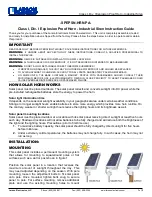
SECTION 2 |
General Information
11
2.3 ADVANTAGES OF PURE SINE WAVE INVERTERS
• The output waveform is a Sine Wave with very low harmonic distortion and
cleaner power like Utility / Grid supplied electricity.
• Inductive loads like microwaves, motors, transformers etc. run faster, quieter
and cooler.
• More suitable for powering fluorescent lighting fixtures containing Power Factor
Improvement Capacitors and single phase motors containing Start and
Run Capacitors.
• Reduces audible and electrical noise in fans, fluorescent lights, audio amplifiers,
TV, fax and answering machines, etc.
• Does not contribute to the possibility of crashes in computers, weird print outs
and glitches in monitors.
2.4 SOME EXAMPLES OF DEVICES THAT MAY NOT WORK PROPERLY
WITH MODIFIED SINE WAVE AND MAY ALSO GET DAMAGED
ARE GIVEN BELOW:
• Laser printers, photocopiers, and magneto-optical hard drives.
• Built-in clocks in devices such as clock radios, alarm clocks, coffee makers, bread-
makers, VCR, microwave ovens etc. may not keep time correctly.
• Output voltage control devices like dimmers, ceiling fan / motor speed control
may not work properly (dimming / speed control may not function).
• Sewing machines with speed / microprocessor control.
• Transformer-less capacitive input powered devices like (i) Razors, flashlights,
nightlights, smoke detectors etc. (ii) Some re-chargers for battery packs used in
hand power tools. These may get damaged. Please check with the manufacturer
of these types of devices for suitability.
• Devices that use radio frequency signals carried by the AC distribution wiring.
• Some new furnaces with microprocessor control / oil burner primary controls.
• High Intensity Discharge (HID) lamps like Metal Halide Lamps. These may get
damaged. Please check with the manufacturer of these types of devices
for suitability.
• Some fluorescent lamps / light fixtures that have Power Factor Correction
Capacitors. The inverter may shut down indicating overload.
• Induction Cooktops.
2.5 POWER RATING OF INVERTERS
INFO
For proper understanding of explanations given below, please refer to
i
definitions of Active / Reactive / Apparent / Continuous / Surge Powers,
Power factor and Resistive / Reactive Loads at Section 2.1 under
“DEFINITIONS”.












































